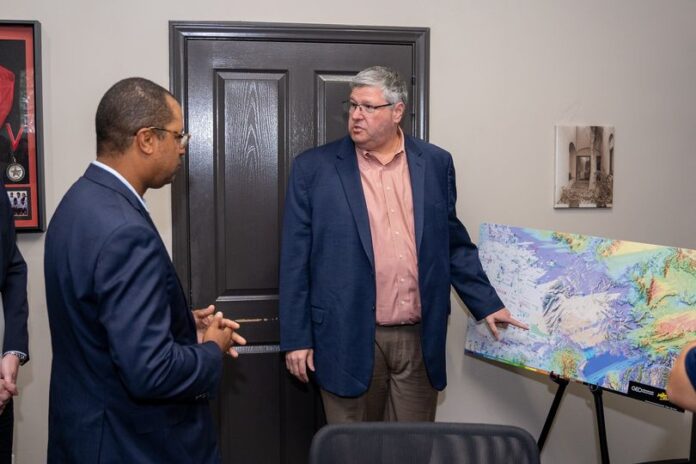LAS VEGAS — A FM radio station broadcast licensee serving multicultural audiences in both Southern Nevada and in Southwestern Utah seeks to gain new business through the use of two technologies being offered to stations across the U.S. by Chris Devine’s GeoBroadcast Solutions.
To gain a first-hand look of what “ZoneCasting” and “MaxxCasting” can accomplish, a FCC Commissioner aligned with the Democrats last week took a visit to Las Vegas.
Geoffrey Starks visited FM siblings KADD-FM 93.5 and KXLI-FM 94.5 to review its plans following the implementation of ZoneCasting technologies during the trial period of FM geotargeting.
The Commission approved the use of hyper-localized content in April. In the Las Vegas market, Eric Palacios-led Radio Activo Broadcasting believes it can bring new riches to two stations that can reach Southern Nevada but only with fringe signals — until GeoBroadcast Solutions got involved.
With “MaxxCasting” and “ZoneCasting,” terrain issues were reduced for each station while Radio Activo has a vision for KADD that will see Las Vegas serve one zone with its own main signal. Three boosters will deliver local content, too. Then, St. George, Utah, will be served from another zone with four boosters broadcasting content specifically for that area.
Some multicultural broadcasters have heralded the new technology as a way to level the playing field against bigger corporate-owned radio stations, offering fresh ways to boost revenue.
In contrast, groups such have the NAB have expressed concerns that geo-targeting could reset advertising rates downward, putting all radio stations at risk of lower rates and disparities.
Since May, licensed FM stations can apply for experimental authority to broadcast localized content on up to 25 FM booster stations for one year, with potential extensions. These boosters can replace the main station’s signal with localized programming for up to three minutes per hour, with no rollover of unused time.
The new rules also require boosters to comply with the Emergency Alert System, ensuring they broadcast emergency alerts like their primary FM stations. Boosters must also avoid causing interference with the primary station’s signal, although differences in programming are not considered interference.
Radio Activo Broadcasting PD Fabian Saldivar commented, “The increase in market coverage will allow our stations to better serve the growing Latino community in Southern Nevada. ZoneCasting gives us a competitive advantage, enabling us to reach underserved areas and customize marketing strategies to meet the specific needs of each community.”
— With reporting by Cameron Coats in New York and Adam R Jacobson in Boca Raton, Fla.




